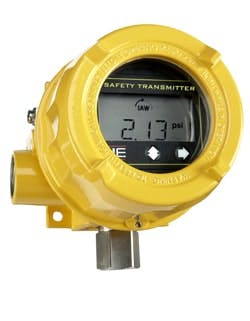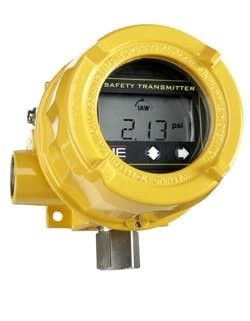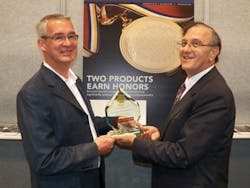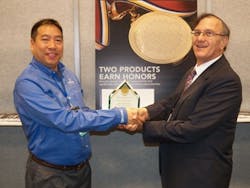For more than 50 years, Chemical Processing has conferred Vaaler Awards on products that promise substantial important benefits to plants. To be eligible for this year’s awards, a product must have been commercialized in the United States between May 2013 and June 2015.
The awards, which were first bestowed in November 1964, are named after John C. Vaaler (1899–1963), chairman of Chemical Processing’s Editorial Board from 1961 until his death. He became editor-in-chief of Chemical Processing in 1946, after 24 years in the chemical and related industries.
Chemical Processing’s Editorial Board, which consists of technical professionals with diverse responsibilities and from a variety of industry sectors (see sidebar), evaluated 18 entries in 7 categories for technical significance, novelty or uniqueness, and breadth of applicability. This impartial panel didn't have to confer any awards — but chose to honor two products:
• The One Series Safety Transmitter from United Electric Controls in the Instrumentation and Controls category; and
• The DeltaV Virtual Studio from Emerson Process Management in the Software and Internet Technologies category.
Figure 1. Device eliminates the need for a programmable logic controller and cuts system reaction time. Source: United Electric Controls.
Transmitter Enhances Safety Systems
The One Series safety transmitter (ST) for temperature or pressure monitoring reduces the cost and simplifies the implementation of a safety instrumented system (SIS), says United Electric Controls (UE), Watertown, Mass. Acting as the sensor component of an SIS, the ST suits applications including safety shutdown, safety interlock, trip alarm, on/off control and emergency activation of valves, pumps, compressors, etc. Certified for use in safety integrity level (SIL) 2 systems and capable of SIL 3, the transmitter can be used for critical safety applications requiring IEC 61508-certified products, notes the company.
Many chemical plants rely on electromechanical switches as sensors for alarm and shutdown applications. The trend toward “smart” instrumentation has resulted in costly and complex plant upgrades, replacing switches with process transmitters that require new wiring and control schemes as well as upgraded logic solvers, notes UE. By combining a logic solver and high-capacity safety relay output with an industry-standard transmitter in one explosion-proof enclosure, the ST achieves significant costs savings and reduced complexity. The unit eliminates the need for a safety programmable logic controller (PLC) and cuts SIS reaction time to 100 milliseconds.
Rick Frauton (left), senior product marketing manager of United Electric Controls, accepting the Vaaler Award for the One Series Safety Transmitter from Chemical Processing Editor in Chief Mark Rosenzweig. The One Series Safety Transmitter won in the Instrumentation and Controls category.
The set point and dead band of the safety relay output are programmable over the entire range of the sensor. The relay can switch up to 250 VAC at 5 amp, which is unique among currently available transmitters, says the company. This capability allows the ST to initiate an emergency shutdown directly from the transmitter, saving time and obviating a PLC and its associated wiring. Fewer components and less wiring translate to increased system reliability and availability, says UE.
The ST has no moving parts and includes patented self-diagnostics that monitor all safety-critical functions of the instrument and external wiring connections. This contributes to a safety failure fraction of 98.8%, the highest of any SIL-certified sensor, adds the company.
Software Eases Virtualization
The DeltaV Virtual Studio from Emerson Process Management, Round Rock, Texas, facilitates creating and maintaining virtual control systems for development, testing, training and online production. It is designed to make every step of setting up a virtualized control system easy and consistent, says the company.
Many chemical manufacturers must deal with control systems with outdated hardware and legacy software that are difficult to maintain. Virtualization can cut control-system lifecycle costs and computer hardware dependence; it can decrease the amount of hardware to buy and maintain, and provide greater configuration flexibility. Virtualization also can extend system life by enabling easy replacement of obsolete workstations with new virtualization hardware; updates of software and hardware are independent of each other and much less disruptive to plant operations. In addition, virtualization can provide high availability and disaster recovery features to increase system reliability and protect against disruptive events. However, companies worry that virtualization may make control systems more difficult and complicated to implement and maintain. DeltaV Virtual Studio reduces the complexity while providing all the benefits of virtualization technology, notes Emerson.
Figure 2. Prebuilt virtual machine templates and predefined virtual networks simplify implementation. Source: Emerson Process Management.
DeltaV Virtual Studio is a virtualization environment designed specifically for the process industries to facilitate easy deployment of virtual control systems for both online and offline use, says the company. It contains virtual machine templates for control system servers, workstations, controllers, input/output subsystems and safety-system logic solvers. The templates come preconfigured with the required control system networks and DeltaV software. This simplifies system set-up and reduces the risks of configuration errors.
The software also affords chemical companies opportunities for remote testing and configuration in cloud-based engineering environments, adds Emerson.
Al Lee (left), DeltaV Platform Business Development Manager for Emerson Process Management accepting a Vaaler Award for DeltaV Virtual Studio from Mark Rosenzweig, Editor in Chief of Chemical Processing. The DeltaV Virtual Studio won in the Software and Internet Technologies Category.
THE JUDGES
Vic Edwards, process safety consultant, Houston
Tim Frank, associate R&D director, Dow Chemical, Midland, Mich.
Fred Gregory, process safety and risk manager, Lubrizol, Deer Park, Texas
Ben Paterson, senior engineering advisor, Eli Lilly, Indianapolis
Roy Sanders, process safety consultant, Lake Charles, La.
Ellen Turner, market development manager, Eastman Chemical, Kingsport, Tenn.
Jon Worstell, consultant, Houston
Sheila Yang, principal engineer, Genentech, South San Francisco, Calif.
About the Author
Mark Rosenzweig
Former Editor-in-Chief
Mark Rosenzweig is Chemical Processing's former editor-in-chief. Previously, he was editor-in-chief of the American Institute of Chemical Engineers' magazine Chemical Engineering Progress. Before that, he held a variety of roles, including European editor and managing editor, at Chemical Engineering. He has received a prestigious Neal award from American Business Media. He earned a degree in chemical engineering from The Cooper Union. His collection of typewriters now exceeds 100, and he has driven a 1964 Studebaker Gran Turismo Hawk for more than 40 years.





